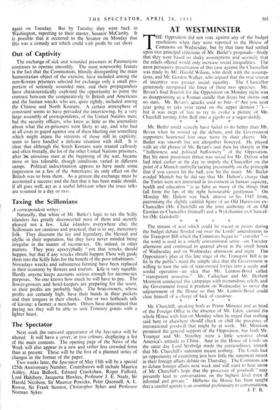AT WESTMINSTER
THE Opposition did not vote against any of the budget resolutions when they were reported to the House of Commons on Wednesday, but by that time had settled upon two principal criticisms of Mr. Butler's proposals—firstly that they were based on shaky assumptions and secondly that the reliefs offered would only increase social inequalities. The most persuasive presentation of this case against the Chancellor was made by Mr. Harold Wilson. who dealt with the assump- tions, and Mr. Gordon Walker, who argued that the true source of incentive was greater social equality. The ( hancellor generously recognised the force of these two speeches. Mr. Bevan's final flourish for the Opposition on Monday night was as disappointing as a Roman candle that fizzes but shoots out no stars. Mr. Bevan's attacks used to bite—(" Are you next year going to take your stand on the upper denture ? ")— i but it was inept of him to try to evoke a picture of Mr. Churchill turning John Bull into a gigolo or a sugar-daddy. * * * * Mr. Butler could scarcely have failed to do better than Mr. Bevan when he wound up the debate, and the Government supporters heartened him once more by their cheers. Mr. Butler was smooth but not altogether honeyed. He played with an old phrase of Mr. Bevan's and then hit sharply at the " hollowness and political buffoonery " of the Opposition. But his most passionate thrust was saved for Mr. Dalton who had tried earlier in the day to impale the Chancellor on the point of a Munich umbrella (acting presumably on the principle that if you cannot hit the ball, you hit the man). Mr. Butler evaded Munich but he did say that Mr. Dalton's charge that the Tories were not interested in investment in human capacity. health and education " is as false as many of the things that fall from the lips of the right honourable gentleman." On Monday Mr. Dalton was back almost to his 1945 form, patronising the slightly caddish figure of an Old Harrovian ex- Chancellor (Mr. Churchill) on the joint authority of an Old Etonian ex-Chancellor (himself) and a Wykehamist ex-Chancel- lor (Mr. Gaitskell). * * * ' * The stream of acid which could be traced at points during the budget debate flooded out over the Lords' amendments to the Transport Bill which the Commons began to " consider"-- the word is used in a strictly conventional sense—on Tuesday afternoon and continued to quarrel about in the small hours of Wednesday and on Wednesday afternoon and night. The Opposition's plan at this late stage of the Transport Bill is to fix in the public's mind the simple idea that the Government is willing to turn the sale of state-owned lorries into a seedy and sordid operation—an idea that Mr. Lennox-Boyd called " transparent nonsense." Mr. Callaghan and Mr. Herbert Morrison conducted this campaign with tremendous relish, and the Government found it prudent on Wednesday to move the adjournment of the House so that Mr. Lennox-Boyd could clear himself of a charge of lack of candour.
* * * * Mr. Churchill, speaking both as Prime Minister and as head of the Foreign Office in the absence of Mr. Eden, carried the whole House with him on Monday when he urged that nothing said here or elsewhere should check or chill the processes of international goodwill that might be at work. Mr. Morrison promised the general support of the Opposition. but both Mr. Younger and Mr. Strachey were a little sensitive about America's attitude to China. And in the House of Lords on the same day Lord Strabolgi made the extraordinary remark that Mr. Churchill's statement meant nothing. The Lords had an opportunity of examining just how little the statement meant in their foreign affairs debate on Thursday. The Commons are to debate foreign affairs next week and will want to hear more of Mr. Churchill's hope that the processes of goodwill " may presently lead to conversations on the highest level even if informal and private." Hitherto the House has been taught that a careful agenda is an essential preliminary to conversations. J. F. B.


































 Previous page
Previous page